You’ll have more energy
The cells throughout your body need water to function. “Cells contain water and are surrounded by water,” says Ronald Navarro, MD, orthopedic and sports medicine surgeon at Kaiser Permanente South Bay Medical Center in Harbor City, California. “In dehydration, cell membranes become less permeable, hampering the flow of hormones and nutrients into the cell and preventing waste products that cause cell damage from flowing out.” When that’s happening, your energy is sapped and fatigue can take over, according to a review of hydration research published in the journal Nutrition Reviews.
How much water do you need to boost energy? Depending on who you ask, the exact amount varies. Dr. Navarro points to the most agreed-upon recommendation of six to eight 8-ounce glasses of water daily. He points out that this can vary, though. “Some adults may need more or less, depending on their overall health, including if they have certain illnesses, take specific medications, and more,” he explains. “It also depends on how much they exercise and the level of intensity, and how hot and dry the weather is.” If you’re interested to know how much water your body is hankering for, talk to your primary care doctor. (But also keep in mind that too much fluid can lead to hyponatremia, a potentially life-threatening condition.)
Here are some good things that can happen if you are consuming the right amount of fluids and avoiding dehydration.

Your memory may improve
Your brain is hugely dependent on fluid to work properly—all those synapses and neurons need liquid to fire properly. According to research published in the British Journal of Nutrition, dehydration affects your cognitive function and mood, and being severely dehydrated can affect your short-term memory. And yet, according to Dr. Navarro, some polls estimate that upwards of 75 percent of Americans suffer from chronic dehydration. And that number worsens in summer: “We see the rate of dehydration increase in the summer and autumn, when temperatures are higher and perspiration is more pronounced,” he says. (Any of these types of water can count towards your daily intake.)

Your focus may increase
Ever feel like you have no control over your attention span? Your mind just wanders no matter how hard you try to focus on the task at hand? Drink a big glass of water and watch what happens: According to researchers from Georgia Tech, even mild dehydration affects your ability to focus and do your job. Just like sleep, maintaining a healthy diet, and making time to sweat it out in your favorite workout class or log miles on your nearby running path, water is one of the most essential needs of your body. In fact, since we’re made up of so much water, it makes sense why we would constantly need it to replenish, cleanse, and feed our system. (Don’t miss the surprising benefits of lime water for your health.)
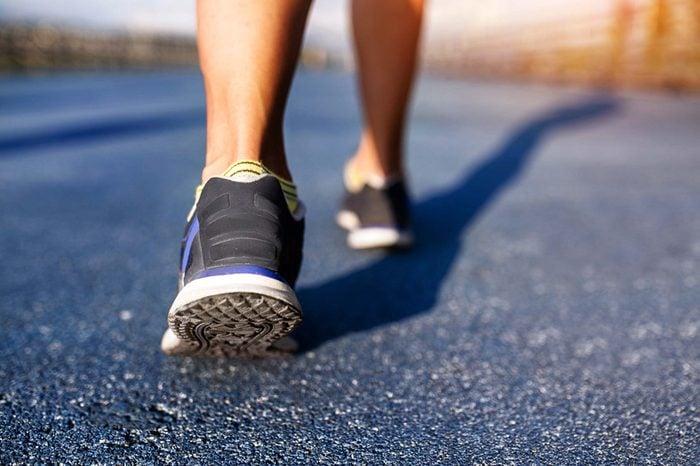
You may be stronger and faster
Ever feel sore during a workout, even though you didn’t exercise the day before? Those aches and pains, as well as the difficulty you experience when trying to lift a heavier weight or push through that extra mile, can be due to dehydration and not your lack of strength. Dr. Navarro says that when we take in the right amount of water for our bodies, our muscles become more relaxed, which increases energy and maximizes our performance—all good reasons to adopt these tips for getting more water into your diet.
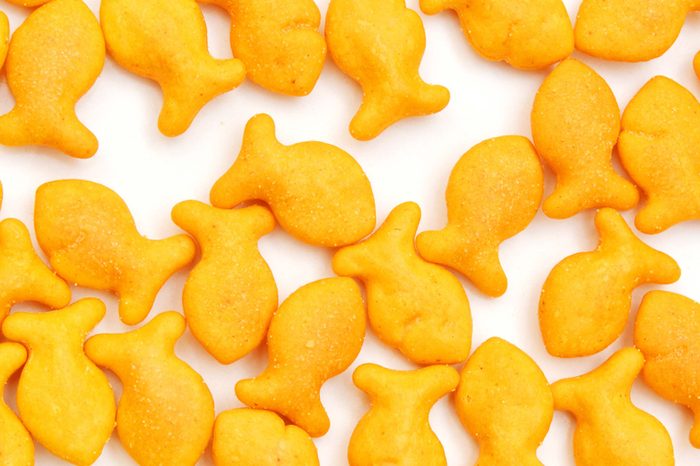
You may reduce mindless snacking
Ever find yourself eyeing the ice cream in your fridge late at night or taking a sampling of your kid’s Goldfish, even though you know better? Instead of thinking you have hunger pains, reconsider that you’re simply thirsty. Dr. Navarro says that, more often than not, people mistake hunger for thirst, and that if you downed some water instead of those junk foods, you would feel just as full. “Proper hydration can serve as an appetite suppressant and help with weight loss or weight management,” he notes.

Your digestion may become more reliable
Though there’s no magical number of times you should move your bowels, it’s definitely true that your bowel movements can offer real insight into your health. And if you struggle with consistency and often feel bloated or uncomfortable, you probably need to chug that water bottle ASAP. “People who drink enough water usually have regular bowel movements. Hard bowel movements or constipation can be a sign that you aren’t getting enough water,” Dr. Navarro says. Also consider these other reasons you’re constipated.
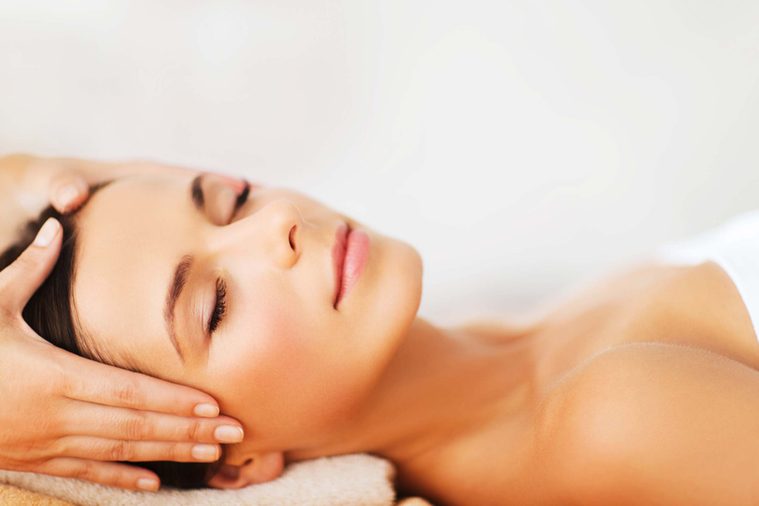
Your skin may be more radiant
Ever go for a spa treatment—like a massage or facial—and your therapist makes a point to remind you to drink some water instead of the champagne you’re eyeing? That’s because skin can benefit greatly from hydration, and, for some, hydrating can clear up your skin or make it look younger. “Our skin, the largest organ in our bodies, relies on water to produce new cells and give us that glow,” Dr. Navarro says. “Our skin also needs water do its job of regulating the body’s temperature.” When people who don’t normally drink much water added more H2O to their diet, the effects showed up on their skin, making it more elastic and moist. Again, though, it is possible you’re drinking too much water, too—watch out for the signs you’re over-hydrating.
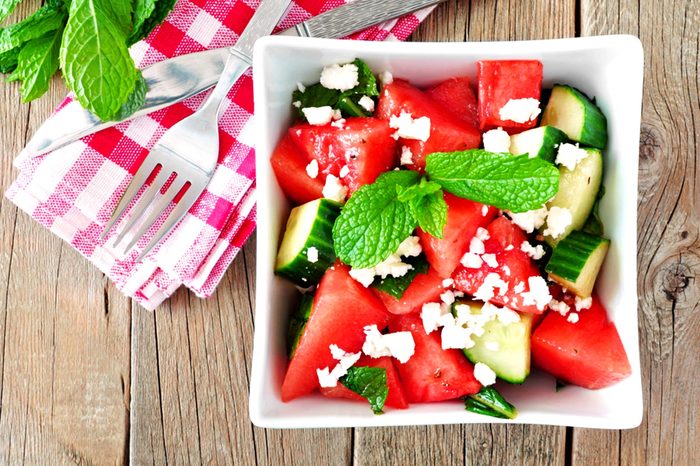
You may need fewer calories
A 2016 study involving more than 18,000 adults from the University of Illinois found that when people increased their daily water intake by one to three cups (on top of the four they drank on average), they ate less: Their food intake dropped by as much as 205 calories a day.
According to Dennis Cardone, DO, chief of primary care sports medicine at NYU Langone Orthopedics, drinking water before—and during—meal fills you up faster, displacing the desire and need for additional calories. “Drinking water before and during a meal can decrease appetite and assist in weight loss,” he notes. Choosing foods with high water content will also help. Many fruits and vegetables have high water content, so they can provide additional ounces of water without you having to drink anything. Dr. Cardone recommends watermelon, cucumber, tomatoes, grapes, and cherries.
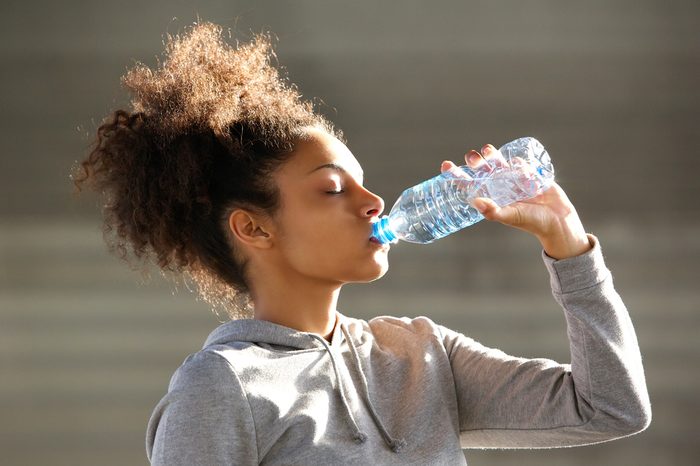
You’ll run cooler
“When we exercise, our bodies cool off by sweating,” says Dr. Navarro. “As we perspire, we lose necessary body fluids. If we do not replace these fluids, we become dehydrated. This makes it difficult to sweat and cool down, which can result in a heat injury,” he explains. If you’re looking for easy ways to stay hydrated during exercise, check out this trendy solution from SMITH + STARR. Co-founders Chelsea Alexander and Fallyn Smith were inspired to create a bag that offers a hydration solution, so they wouldn’t have to lug around a water bottle while commuting in their home city, San Francisco, or while going hiking or camping. Their bag, The Conway, is a cross-body handbag that doubles as a hydration pack. It looks like a bag you’d take while running errands or while out with your friends, but it contains a removable water pouch that holds 17 ounces and a tube for easy hydration right from the shoulder strap. If you need more water or prefer to carry weight on both shoulders, you can also purchase a hydration backpack.

You’ll be in a better mood
How much water you drink can mess with your mood, according to research from the University of Connecticut, which looked at the water-drinking habits of 120 college-aged women. The more water they drank, the less tense, depressed, and angry they were. So drink up, says Dr. Navarro: If you get tired of drinking good old-fashioned H20, consider upping your hydration game by making your “brew” sparkling or flavored. Water with bubbles offers the same benefits of regular water, and added fruit can make water more interesting while still giving you the awesome benefits of an adequate intake.

